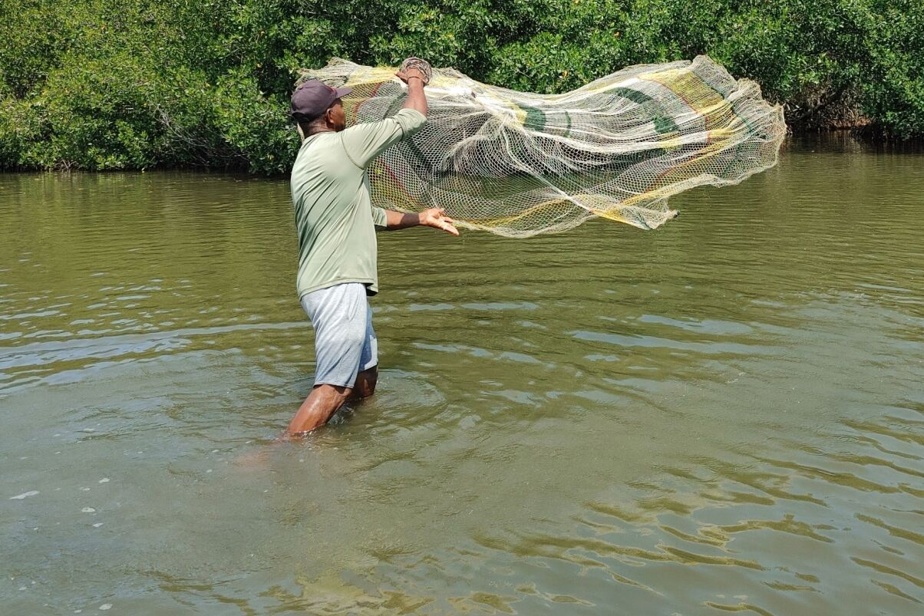(Cartagena de Indias) When you leave the hotel, it’s already hot. In Colombia, the sun takes pleasure in hitting the skin as soon as it rises. The bus opens its doors. He takes us to learn how to fish for crab.
The journey lasts around thirty minutes, but we are clearly being transported elsewhere. If the hotel is located in the tourist area of Cartagena, we are now heading towards a place where the lifestyle is rather peaceful, family, community. Where we survive by fishing in the mangroves.
The bus drives onto the sand. Through the window, a few buildings, a bit of greenery, wooden installations. Here we are in the small village of La Boquilla, populated by Afro-Colombians who proudly speak Caribbean Spanish – distinct from that of the rest of the country.
Colombia is a land marked by inequalities, explains Hernando Osorio, our guide for the day. The city of Cartagena, which has more than a million inhabitants, is divided into six strata where economic conditions vary widely.
Strata 1 and 2 are found in the south of the city, in poor neighborhoods. Strata 3 and 4 correspond to the middle class. 5 and 6, for their part, house the new American-style constructions. Around twenty years ago, significant investments from the United States enabled the modernization of the city’s wealthy strata – thus widening the wealth gap.
“The buildings where you are staying are 5. La Boquilla is 1,” says Hernando, pointing to the rudimentary dwellings, from which a few curious faces emanate.
On site, the Ecotours group takes care of us. Founded in 1999, its objective is to improve the living conditions of the village through ecotourism, the transmission of the basics of traditional crab fishing, its roots and its customs. This is an employment opportunity for locals, as 100% of Ecotours Boquilla employees are. The activity costs nearly $30 for the tourist. The money raised also allows the community to preserve the mangrove.
We take a few steps on the quay. The heat is rising, and it’s only 9 a.m. The fishermen are hard-working men, you can tell. Their sleeves are rolled up, their hands worn out. The honest look. Around them, crab cages and bait, but also nets and small knives.
The group of around twenty people divides up and sits aboard the boats. Hernando speaks. “There are a lot of people visiting Cartagena who don’t know that nearby is a beautiful, peaceful place in nature,” he says, smiling, as the rush of paddles mixes with the sounds of wildlife. .
Frigatebirds, pelicans, iguanas, raccoons, snakes… there are many of them that inhabit the mangrove, an ecosystem that develops in tropical or subtropical zones. Once we have passed the vegetation, the mangrove corridors, we can put our feet in the water. It barely reaches our knees.
In order to recover the crab, you must lure it with sardines. This is how we find ourselves, supported by the village fishermen, casting nets. You have to throw them so as to cover the largest possible surface area then bring them back towards you by wrapping them around your hand, they explain to us with a coastal accent that is similar to that of Cubans, Dominicans or Puerto Ricans.
Once the sardines are caught, they are cut up. Their flesh, placed in a net box designed specifically for this activity, is used to trap the crustaceans. These, while trying to grab their loot, will remain prisoners of the nets and find themselves at the bottom of the boilers provided for this purpose, at the front of the boats.
The harvest, in addition to providing dinner, is like an ode to traditional work, or a mark of love made to a tight-knit community. We all have the pleasure of immersing ourselves in another culture. And it turns out that our guide, Hernando, does the same thing with ours.
If the fishermen speak to us in Spanish, Hernando takes the opportunity to chat with the group in very good French. He never set foot outside Colombian borders, but studied foreign languages. And he is proud of it, rightly so.
“In the gym, you don’t push with one hand. My younger brother told me: “If you learn French, you will have an advantage over others who just speak Spanish and English.” So I force it with both hands,” he illustrates on the way back.
Before meeting us, Hernando thought he would be dealing with a French, Belgian or Swiss group. European tourists, he said, are common in the area. “When I arrived, my colleague said to me: ‘Look, they’re Canadians. It attracted me like a magnet,” he admits, adding that he considers one day coming to settle in Quebec.
You can feel it, it’s not a sales argument or to create links. Hernando speaks with interest, with seriousness. He is frank, even if he lets his imagination carry him away. “I have a little girl. She dreams of seeing snow. One day, I too would like to feel the snow. I will be like a child. »
After these words, he gives a discreet smile. He looks out at the sea.
